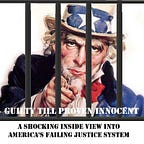Everything you Need to Know About Posting Bond
At your arraignment, the judge (or magistrate) will read your indictment out loud, find out if you’re already represented by counsel and, if not, let you know that one will be provided if you cannot afford one. At that point, the judge will make an initial consideration of bond. The usual key factors are age, family ties, community ties and type of employment, although there are others. In my case, for example, I was captured overseas. I didn’t have a prayer. The stated goal is to ensure that you’ll return for future proceedings if bond is granted, but they also know how much more difficult it is to fight your case from behind bars — a major advantage for prosecutors. As a result, the government’s knee-jerk reaction is to contest almost all requests for bond (unless it’s been negotiated in advance or the crime is so low-level it doesn’t pass the giggle test). Expect to be called the worst flight risk ever, a menace to society or whatever else they can think of. It’s all part of the process. The judge, of course, is then inclined to defer to your prosecutor’s concerns. While this does not always result in an outright denial, it will at least lead to a higher bond and stricter terms and conditions. So much for “innocent until proven guilty.”
You retain the right to request a subsequent bond hearing(s) if bond is denied or placed exorbitantly high, but you’re back again in front of the same magistrate, so you can imagine what to expect. Although, my codefendant Paul, had his bond request initially denied and later set at $1 million a few months later. So, it’s possible. Prosecutors may also request removal of bond at some later date for a claimed violation of any terms or conditions. Steve G. was hauled in for a rehearing, with the AUSA claiming his home, which he put up as collateral, was in foreclosure. When Steve protested the judge pried further, and the AUSA clarified by saying “well, we froze his accounts, so I assumed……” Steve’s bond was continued but the AUSA, of course, was let off with only mild admonishment. Go figure.
At this point, you’ll benefit greatly if you’ve previously identified clean funds and assets (versus those subject to confiscation or forfeiture) and having hired an attorney. It can be very difficult to make bond unless you’ve already done so. Assuming you’re granted bond, you can either (i) post the entire dollar amount, (ii) pay a bail bondsman 10–15 percent of the bail amount as a non-refundable fee, or (iii) secure the bond with a high value asset like stocks or real estate. If your assets have been frozen or claimed by the government, you can’t use those but may be allowed to have a friend or family member put up bond for you, subject to the judge’s (or magistrate’s) approval. Regarding bond, once you’re adjudicated not guilty or go to prison, you’ll be able to reclaim whatever you’ve posted for (i) or (iii) once your case has been resolved (unless the government decides it still has a right to make a claim against those assets). However, it’s not like the government just hands it over. You’ll need to make a request, and AUSAs are known to delay the process just because they can. Which brings us to another issue. The government gets highly creative in broadly determining what assets are subject to confiscation and forfeiture. In the case of Barry K., a doctor who merely pre-signed a few Scripts for the sake of convenience for his assistant, the Feds showed up years later to confiscate useless old furniture and clothes. As, you’ll unfortunately come to learn, some parts of the process are primarily geared toward inflicting pain.
One final factor worth mentioning applies to people arrested and arraigned in a jurisdiction outside of where the case is pending. I was initially arraigned in Miami, Florida but my case was out of Tampa. I was arraigned and held for two weeks in FDC Miami before being shipped up to Tampa. The magistrate hearing my arraignment in Miami told me that I could request a bond hearing once I made it to Tampa. I never bothered to waste my time.
Lawrence Hartman is the author of (i) GUILTY TILL PROVEN INNOCENT: A Shocking Inside View Into America’s Failing Justice System, (ii) BLIND GREED: From Ivy League to International Fugitive, and (iii) BLIND JUSTICE: The Consequences of Greed. He has also been featured in articles on Forbes.com, including “The Life of a White-Collar Fugitive Not All That It’s Cracked Up To Be” and “A Voice From Prison Weighs In On Drug Addiction And A Solution.”
